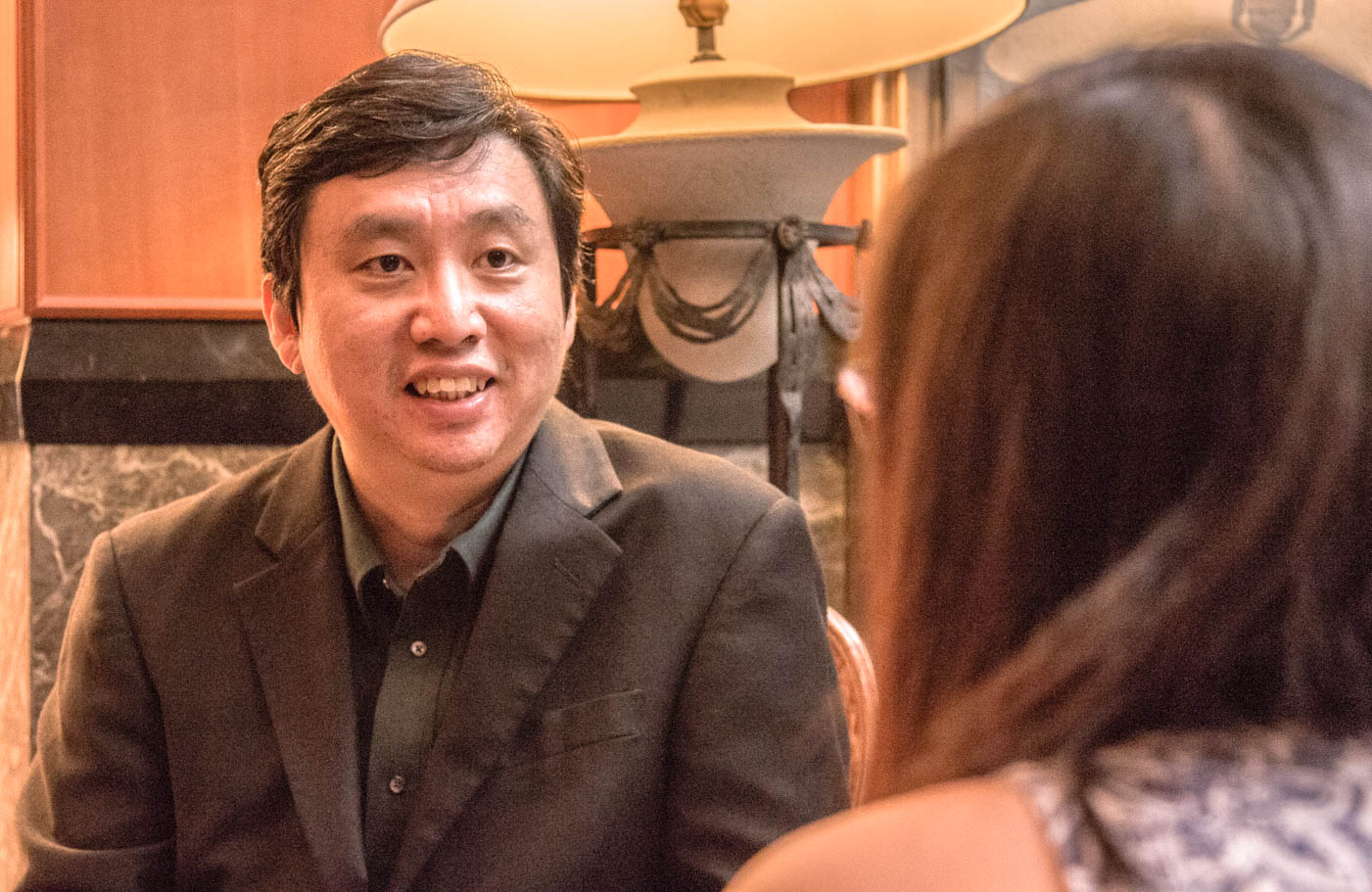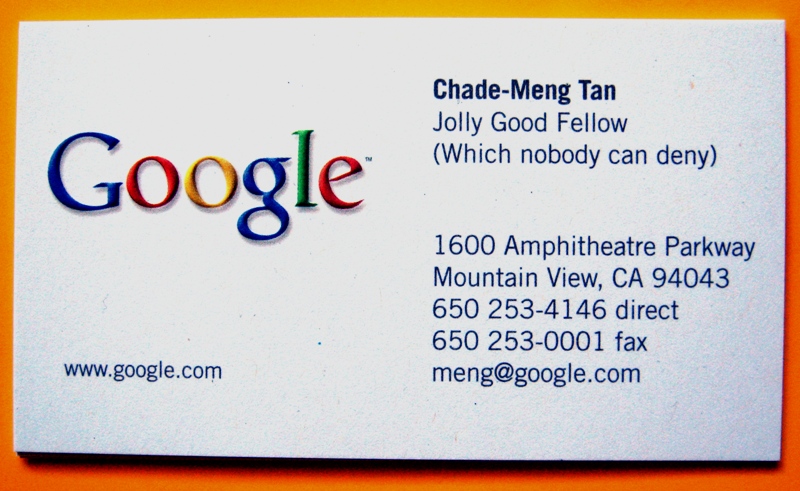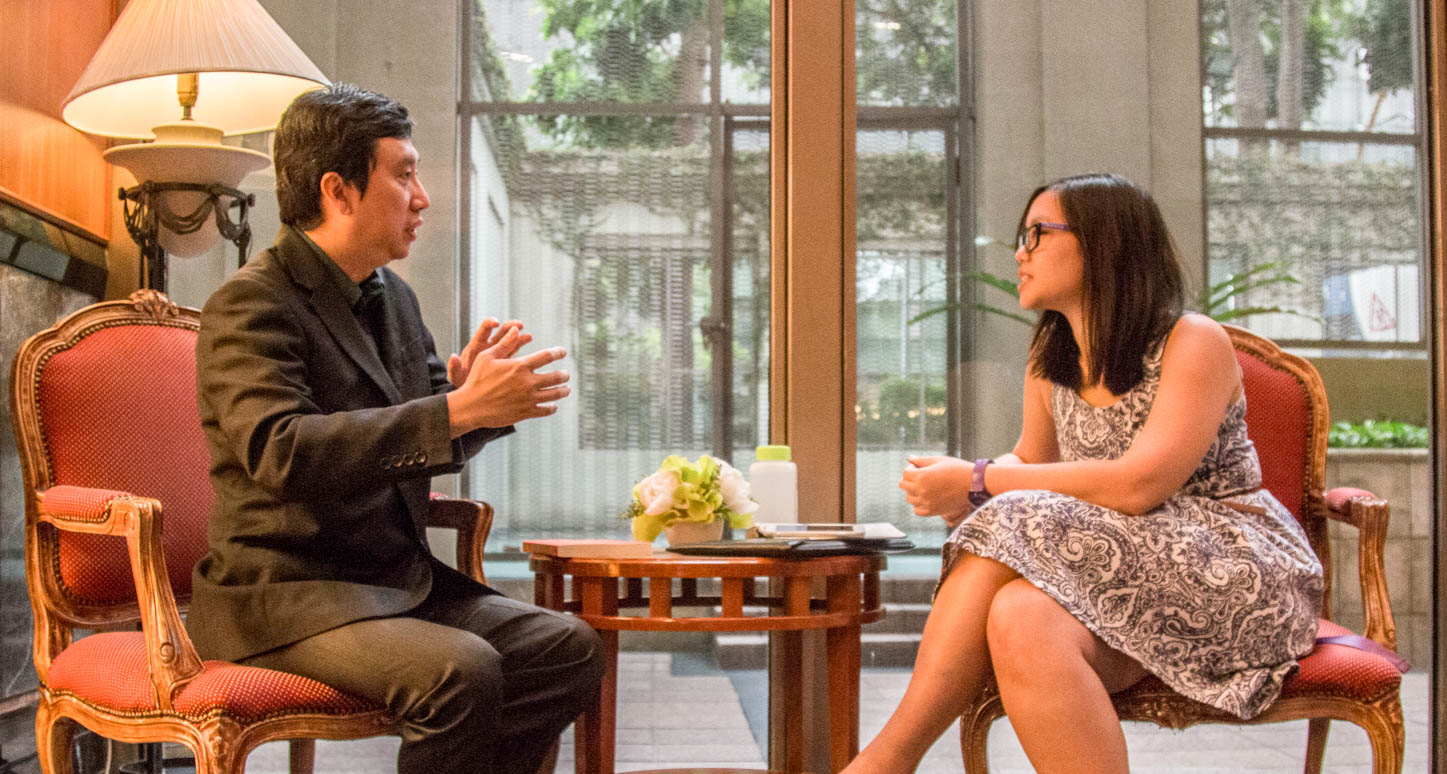“Almost Famous” is a new feature interview series on Mothership.sg. Here, we bring you in-depth stories of people who could be more famous, with a new interview released every fortnight.
Even before we met Singapore's first Googler Tan Chade-Meng in person, he already gave us a hint of his Singaporean-ness, despite having spent roughly two decades living and working in the U.S.
(If this is the first time you heard of Tan, the ex-"Jolly Good Fellow" probably holds a record for the most number of pictures a non-politician Singaporean has taken with famous people.)
When we found him at the lobby of Orchard Parksuites, a place where he and his family stays during his visits back to Singapore, he was in sweatpants, a T-shirt and "uncle" slippers, and tucking into a decidedly strange-looking mixture of hard-boiled eggs and dark soya sauce.
"They only serve their eggs that way here; I have to make do," he explains with a good-natured smile and a shrug.
It's only when he realises he will be photographed for this interview that he shuffles upstairs to put on a blazer and proper pants, but he's no less casual, bubbly, and brimming with stories in our conversation.
Two decades in America later, still speaking Singlish
 Photo by Ng Yi Shu
Photo by Ng Yi Shu
It's a pleasant surprise, indeed, to discover how Singaporean Tan still is — right down to the way he speaks.
"For me, the accent is not an important point. For me, it’s to speak in a way that people understand, so to speak clearly," he says.
He admits that in the first few months he spent studying his self-funded Master's degree in the U.S. (he got his undergraduate engineering degree in Nanyang Technological University), locals had a hard time understanding him.
Being the problem-solver he was, Tan boiled it down to two key issues with Singlish pronunciation of English words: dropping syllables (e.g. from "government" to "gah-men") and not pronouncing their ending consonants.
"For a while I was very annoyed, having this Singaporean accent. Later on, I discovered something: I discovered that this is an asset."
The TED-talk speaker in Tan tells three supporting stories of his experiences, which the engineer in him calls "data points" — one, his observation of the fact that the Dalai Lama (a person Tan really looks up to as a Buddhist) is well-loved, in part because his accent is a significant addition to his charisma.
On the second:
"I was watching an infomercial. It was a Vietnamese guy. He was selling his book on how to get his lifestyle. He was on a boat. He spoke Vietnamese accent. He was surrounded by women in bikini. He said in Vietnamese accent 'You no wanna be rich? You crazy?' (I thought), oh my god, this guy is good. If he didn't have the accent, if he’s a white guy, I mean it’s okay, but because he had the accent, oh my god, it’s very believable."
The third and most conclusive "data point" for him was when he was co-teaching a class on empathy and kindness with an American psychiatrist named Thomas Lewis.
"And Tom said, when I was teaching, he just sat there wondering the entire time, 'What makes Meng so good at this?' At the end of the class, he said he figured it out. I said 'what?' He said: 'it’s the accent. With that accent, whatever you say, it sounds as if you know what you are talking about. I was like, 'ya hor.' For the Ang Moh right, Asian accent is like authentic leh."
Googler no more: How Tan decided to leave the world's best place to work
 Photo from Chade-Meng's blog
Photo from Chade-Meng's blog
So with a job that allows you to put "Jolly Good Fellow (Which nobody can deny)" on your business card, and which involves you teaching people how to be happy, why quit?
Tan, who left Google after 15 years in end-October last year, jokes that he gave himself a "one-third discount for good behaviour" from his sentence of "20 years to life" at the Internet giant that he often tells people.
He admits it was a tough decision — exhaustion hit him while he was in Malaysia, inside a swimming pool after a day where he gave five talks in 24 hours.
"I was just so exhausted.... (and) I was like, 'Maybe it's time to go.' After that day, I thought carefully about it."
His main motivating factor: the need to practise meditation more.
"I see myself as the mediation equivalent of a full-time athlete. A full-time athlete or musician trains for three to six hours a day. I figured I should be doing that because I’m a full-time meditator, or athlete. I should be doing it, but I am not.
And then I asked myself what is THE most important thing I need to do, I need to spend my time on, out of all the things that I’m working on. And realised the number one thing was to deepen the Practice, three hours a day. So that is the main reason this time."
His backup reason makes as much sense as it sounds silly, like many other things he says:
"I decided not to die in Google, so if I don’t die in Google, there is only one other outcome, which is I leave sometime in my lifetime.
So if I’m going to leave sometime in my lifetime anyway, this appears to be it, because I needed the time to build my practice anyway. So that’s it."
We're pretty sure Tan didn't leave on a bad note.
In fact, he made it a point to befriend more than 300 of Google's first employees, welcoming them personally on their first day. He also tells us future celebrities who visit the Google campus can still take photos with him, in the form of a life-sized cardboard standee some ex-colleagues of him made.
Tan's post-Google goals: Build a Zencubator, master inner peace, achieve world peace
 Source: Getty Images
Source: Getty Images
Regrettably, Tan tells us, despite having left Google, he still hasn't been able to meditate three hours per day.
What the former Nobel Peace Prize nominee (for One Billion Acts of Peace) is working on now is trying to build something no one has before: something he calls a "Zencubator".
This, he explains, will be half a start-up incubator space, and half a very strict Buddhist monastery.
"The training monastery is going to be very rigorous. We expect people to reach very high levels of enlightenment in three years or less. So it’s probably in some sense stricter than most monasteries that you know of in the world.
In time, we hope that there will be thousands of centres. There’s going to be a variety but there is commonality – commonality in mindfulness, stability of the mind, or stability of attention, calmness and kindness and compassion. So those things develop to a very high degree."
Tan really wants these monks to be able to practise rigorous meditation full-time, too, and hopes these Zencubators will be able to facilitate that:
"So in the monastery, they will be in retreat some percentage of the time, maybe half the time. And the other percentage of the time, we expect them to be serving the community. Exactly how, we haven’t figured it out. One possibility is to teach meditation to other side, the tech side. We jokingly call these the 'Nirvana' side and 'Nerd-vana' side. So we expect them to spend sometime in the 'Nerd-vana' side teaching.
And then for the 'Nerd-vana' side, it’s a tech base. We expect a free flow of people with a single rule: that the 'Nirvana' side is a quiet space. The 'Nirvana' side is space where people can just walk into, and then be silent."
With these, Tan argues that there is plenty of money to be made, if only investors are daring enough to take a leap of faith with him.
"The reason is for an entrepreneur, I think that the most important skill is resilience.
The number two skill of an entrepreneur, I think, is empathy, for a couple of reasons. One reason is that empathy is the secret of good design... Only when you can empathise with the end user, only if you can think, live and feel like an end user, then you can design something that is good for the end user. And also to your own team, the more empathy you have, the more effective you are as a leader.
So also maybe the third one is creativity. So all three skills can be trained to a very high degree with mindfulness. And so therefore, entrepreneurs who self-select to be in (this) environment, they have an advantage, they get this... then we multiply their probability of success even more.
Therefore, all other things equal, people investing in this group of entrepreneurs, are more likely to make money than the average entrepreneurs."
Tan has so far raised US$1.5 million for the project so far, but is looking to raise US$10 million total.
He'll continue speaking with venture capitalists while also trying to build sustainability for SIYLI (pronounced "silly"), a leadership institute he founded that helps organisations teach their leaders skills in mental mastery, resilience and emotional intelligence.
Being pally with politicians
With all we've learned about Tan from our chat thus far, we were hard-pressed to imagine him having any enemies.
Moreover, Tan is doing his part for Singapore, having pooled the money he's been earning from the book sales (he's written two so far, this one and this more recent one) and his salary and gave it to various charities including his alma mater, NTU, where he contributed five-figure sums each year, followed by a $250,000 endowment donation for two scholarships in the names of his parents and in-laws.
Sure enough, many a president and leader count him as a friend, having embraced the hallowed space of "Meng's Wall".
He also happens to count among our very own politicians at least three ministers whom he is chummy with — one of whom is Minister for Communications and Information Yaacob Ibrahim (photo above).
But yet:
"Somebody asked me if I was running for public office. I told him I was running AWAY from public office."
So, no — we will not see Tan standing for a presidential or parliamentary election anytime soon. Besides, he jokes that "they are all miserable", while adding on more seriously:
"The problem about being in a position of responsibility, it’s a very big job and it’s 24/7. So Colin Powell was talking about his time as the Secretary of State. He was having a gathering with his grandchildren, and then somebody called him about some island situation in the African Coast... and he has to take care of it.
To me, to us, it seems inconsequential, some island dispute. I would think maybe the Assistant Secretary can take care of it, but it escalated all the way to him. I expect that it’s probably true of anybody in political responsibility. I can’t say whether people are happy or unhappy. But I can say it’s (a) very tough job."
We can't deny Tan's is a tough job too — making world peace happen in his lifetime — but we hope to heck he succeeds, or at least contributes substantially to that end.
Keen to read more of Mothership.sg‘s Almost Famous series?
Almost Famous: The real story of The Real Singapore
Rather Famous: Joseph Schooling goes one-on-one with Mothership.sg
Almost Famous: The Real Singapore couple on love, their Ramen stall and Tin Pei Ling
S’pore orangutan keeper’s story of love for apes, snakes and people
S’porean Navy scholar with computer science degree makes mark in international pop music and EDM
Top photo by Ng Yi Shu.
If you like what you read, follow us on Facebook and Twitter to get the latest updates.
If you like what you read, follow us on Facebook, Instagram, Twitter and Telegram to get the latest updates.
